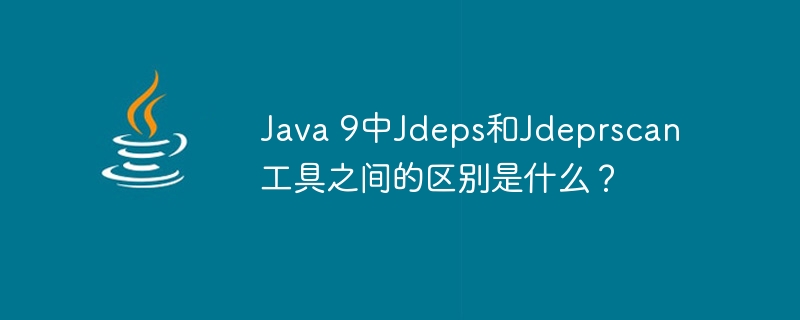
Jdeps 도구를 사용하여 클래스의 종속성을 분석할 수 있습니다. "jdeps -jdkinternals jararchive.jar" 명령을 실행하면 Java 내부 API를 사용하는 모든 클래스 목록이 인쇄됩니다. Jdeps 도구는 종속성에 대한 자세한 설명을 반환하는 반면, Jdeprscan은 특히 "-for-removal" 플래그와 함께 사용하는 또 다른 유용한 도구입니다. 이 도구는 특정 jar 아카이브에 대한 지원 중단된 API의 모든 사용을 보여주며 지원 중단된 jdk 메서드 사용만 표시할 수 있으며 타사 jar의 지원 중단은 이 도구를 사용하여 확인할 수 없습니다 .
아래에서는 "jdeps --help" 명령을 사용하여 옵션의 전체 목록을 볼 수 있습니다.
<strong>C:\Users\user>jdeps --help
Usage: jdeps <options> <path ...>]
<path> can be a pathname to a .class file, a directory, a JAR file.
Possible options include:
-dotoutput <dir>
--dot-output <dir> Destination directory for DOT file output
-s -summary Print dependency summary only.
-v -verbose Print all class level dependences
Equivalent to -verbose:class -filter:none.
-verbose:package Print package-level dependences excluding
dependences within the same package by default
-verbose:class Print class-level dependences excluding
dependences within the same package by default
-apionly
--api-only Restrict analysis to APIs i.e. dependences
from the signature of public and protected
members of public classes including field
type, method parameter types, returned type,
checked exception types etc.
-jdkinternals
--jdk-internals Finds class-level dependences on JDK internal
APIs. By default, it analyzes all classes
on --class-path and input files unless -include
option is specified. This option cannot be
used with -p, -e and -s options.
WARNING: JDK internal APIs are inaccessible.
--check <module-name>[,<module-name>...
Analyze the dependence of the specified modules
It prints the module descriptor, the resulting
module dependences after analysis and the
graph after transition reduction. It also
identifies any unused qualified exports.
--generate-module-info <dir>
Generate module-info.java under the specified
directory. The specified JAR files will be
analyzed. This option cannot be used with
--dot-output or --class-path. Use
--generate-open-module option for open modules.
--generate-open-module <dir>
Generate module-info.java for the specified
JAR files under the specified directory as
open modules. This option cannot be used with
--dot-output or --class-path.
--list-deps Lists the dependences and use of JDK internal APIs.
--list-reduced-deps Same as --list-deps with not listing
the implied reads edges from the module graph
If module M1 depends on M2 and M3,
M2 requires public on M3, then M1 reading M3 is
implied and removed from the module graph.
-cp <path>
-classpath <path>
--class-path <path> Specify where to find class files
--module-path <module path>
Specify module path
--upgrade-module-path <module path>
Specify upgrade module path
--system <java-home> Specify an alternate system module path
--add-modules <module-name>[,<module-name>...]
Adds modules to the root set for analysis
-m <module-name>
--module <module-name> Specify the root module for analysis
--multi-release <version>
Specifies the version when processing
multi-release jar files. should
be integer >= 9 or base.
Options to filter dependences:
-p <pkg>
-package <pkg>
--package <pkg> Finds dependences matching the given package
name (may be given multiple times).
-e <regex>
-regex <regex>
--regex <regex> Finds dependences matching the given pattern.
--require <module-name> Finds dependences matching the given module
name (may be given multiple times). --package,
--regex, --require are mutual exclusive.
-f <regex> -filter <regex> Filter dependences matching the given
pattern. If given multiple times, the last
one will be used.
-filter:package Filter dependences within the same package.
This is the default.
-filter:archive Filter dependences within the same archive.
-filter:module Filter dependences within the same module.
-filter:none No -filter:package and -filter:archive
filtering. Filtering specified via the
-filter option still applies.
Options to filter classes to be analyzed:
-include <regex> Restrict analysis to classes matching pattern
This option filters the list of classes to
be analyzed. It can be used together with
-p and -e which apply pattern to the dependences
-P -profile Show profile containing a package
-R -recursive Recursively traverse all run-time dependences.
The -R option implies -filter:none. If -p,
-e, -f option is specified, only the matching
dependences are analyzed.
-I --inverse Analyzes the dependences per other given options
and then find all artifacts that directly
and indirectly depend on the matching nodes.
This is equivalent to the inverse of
compile-time view analysis and print
dependency summary. This option must use
with --require, --package or --regex option.
--compile-time Compile-time view of transitive dependences
i.e. compile-time view of -R option.
Analyzes the dependences per other given options
If a dependence is found from a directory,
a JAR file or a module, all c*lasses in that
containing archive are analyzed.
-q - quiet Do not show missing dependences from
--generate-module-info output.
-version --version Version information</strong>위 내용은 Java 9에서 Jdeps와 Jdeprscan 도구의 차이점은 무엇입니까?의 상세 내용입니다. 자세한 내용은 PHP 중국어 웹사이트의 기타 관련 기사를 참조하세요!